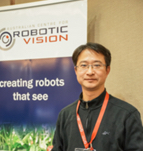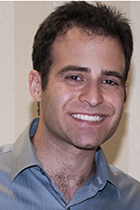Seminar
Two Tales about Image Classification
Abstract: This talk tells two tales about image-classification systems, both of which are motivated by the real-world deployment of such systems. The first tale introduces a new convolutional neural network architecture, called multi-scale DenseNets, with the ability to adapt dynamically to computational resource limits at inference time. The network uses progressively growing multi-scale convolutions, dense [...]
Optimizing ankle prostheses to improve walking in transtibial amputees
Abstract: With a prosthetic device, people with a lower limb amputation can remain physically active, but most do not achieve medically recommended physical activity standards and are therefore at a greater risk of obesity and cardiovascular disease. Their reduced activity may be attributed to the 10 - 30% increase in energetic cost during walking compared [...]
Dense 3D Shape Reconstruction of Complex Dynamic Scene with a Single Monocular Camera
Abstract: In this talk, I will describe our recent work (presented at ICCV 2017) on monocular camera based 3D geometry reconstruction of a non-rigid dynamic scene. We aim to answer an open question in multi-view geometry, namely, "Is it possible to recover the 3D structure of a complex dynamic environment from two image frames captured by [...]
Learning to Visually Reason
Abstract: Visual reasoning is a core capability of artificial intelligence. It is a necessity for effective communication, planning, and for question/answering tasks. In this talk, I discuss some recent explorations into visual reasoning for question/answering, game playing and dialog. I also describe our new reinforcement learning platform ELF; an Extensive, Lightweight and Flexible research platform [...]
Carnegie Mellon University
Dense Planar-Inertial SLAM for Large Indoor 3D Reconstruction
Abstract Reconstructing the dense 3D models of indoor environments in real-time is key to many robotics applications, such as navigation, inspection, and augmented reality. It is also a challenging problem due to the accumulation of drift, large amount of data, limited computation, and occasional lack of visual features. We develop an RGB-D simultaneous localization and [...]
Planning Algorithms for Multi-Robot Active Perception
Abstract A fundamental task of robotic systems is to use on-board sensors and perception algorithms to understand high-level semantic properties of an environment. The performance of perception algorithms can be greatly improved by planning the motion of the robots to obtain high-value observations. In this talk I will present a suite of planning algorithms we [...]
Doing a Post-doc: Should I do one? How do I find one? How do I pick? What next?
Abstract: In this talk, I will describe the ins and outs of getting a job as a post-doctoral researcher ("doing a post-doc"). I will first describe a number of reasons why one might want to do a post-doc, as well as a few reasons not to do one. I will next describe how to choose [...]
Towards Lifelong Robot Learning
Abstract: Google Brain Robotics vision is to leverage learning to push the field of robotics forward. As such, we have engaged in research ranging in application from navigation to grasping and approach from deep RL to learning from demonstration. Fundamentally, our research is built around the core idea of lifelong learning. Our long term goal [...]
Exploring Human-Robot Trust during Emergencies
Abstract: This talk presents our experimental results related to human-robot trust involving more than 2000 paid subjects exploring topics such as how and why people trust a robot too much and how broken trust in a robot might be repaired. From our perspective, a person trusts a robot when they rely on and accept the [...]








